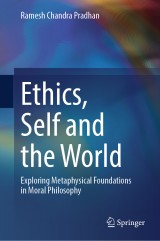Details

Ethics, Self and the World
Exploring Metaphysical Foundations in Moral Philosophy|
128,39 € |
|
| Verlag: | Springer |
| Format: | |
| Veröffentl.: | 27.07.2024 |
| ISBN/EAN: | 9789819734962 |
| Sprache: | englisch |
| Anzahl Seiten: | 200 |
Dieses eBook enthält ein Wasserzeichen.
Beschreibungen
<p>This book delves into the profound question of whether moral philosophy rests upon metaphysical foundations. Contrary to the assertions of moral relativists such as John Mackie and Bernard Williams, who contend that ethics is devoid of metaphysical grounding, this work challenges their claims. Designed for those who approach morality and view ethics as a subject firmly anchored in metaphysics, this book is an essential exploration. It delves into the metaphysical underpinnings of morality, examining the source of morality in the metaphysical self, the intricate relations between ethics, self and the world and the interplay between ethics and metaphysics. It tackles fundamental questions, such as why freedom is the foundational postulate of morality and why, akin to Kant, we must acknowledge the importance of moral law. Furthermore, the chapters explore the nature of values and their metaphysical standing, the practical application of morality in the real world, the essence of virtues as attributes of the human soul, the interconnectedness of morality with rationality and spirituality and the challenges ethics faces from relativism and naturalism. The book appeals to moral philosophy researchers and students interested in unraveling morality's metaphysical roots. It offers an investigative exploration of the intricacies surrounding the problems of morality.</p>
<p> </p>
<p> </p>
<p>Chapter 1: The Sources of Morality.- Chapter 2 : Ethics, Self and the World.- Chapter 3 : Ethics and Metaphysics.- Chapter 4 : Morality and Freedom .- Chapter 5 : The Primacy of the Moral Law.- Chapter 6 : Value Theory.- Chapter 7 : Ethics in the World.- Chapter 8 : Virtue Ethics .- Chapter 9 : Morality, Rationality and Spirituality.- Chapter 10 : Ethics, Relativism and Naturalism Epilogue.- Chapter 11 : Bibliography.- Chapter 12 :Index.</p>
<p>Ramesh Chandra Pradhan was a professor at the Department of Philosophy, University of Hyderabad, from 1998 to 2015. He taught at Utkal University, Bhubaneswar, and Karnataka University, Dharwad, before joining the University of Hyderabad in 1987. He was a Commonwealth Academic Staff Fellow at the University of Oxford from 1990 to 1991. He has specialized in the philosophy of Wittgenstein, the philosophy of language, the philosophy of mind, and metaphysics. He has authored a number of books on the philosophy of Wittgenstein, philosophy of language and metaphysics. He has contributed many papers to philosophy journals.</p>
<p>This book delves into the profound question of whether moral philosophy rests upon metaphysical foundations. Contrary to the assertions of moral relativists such as John Mackie and Bernard Williams, who contend that ethics is devoid of metaphysical grounding, this work challenges their claims. Designed for those who approach morality and view ethics as a subject firmly anchored in metaphysics, this book is an essential exploration. It delves into the metaphysical underpinnings of morality, examining the source of morality in the metaphysical self, the intricate relations between ethics, self and the world and the interplay between ethics and metaphysics. It tackles fundamental questions, such as why freedom is the foundational postulate of morality and why, akin to Kant, we must acknowledge the importance of moral law. Furthermore, the chapters explore the nature of values and their metaphysical standing, the practical application of morality in the real world, the essence of virtues as attributes of the human soul, the interconnectedness of morality with rationality and spirituality and the challenges ethics faces from relativism and naturalism. The book appeals to moral philosophy researchers and students interested in unraveling morality's metaphysical roots. It offers an investigative exploration of the intricacies surrounding the problems of morality.</p>
Highlights the metaphysical roots of ethics and the transcendental nature of moral philosophy Deals with substantive ethics rather than metaethics Presents open-ended, analytical, and non-dogmatic arguments

















